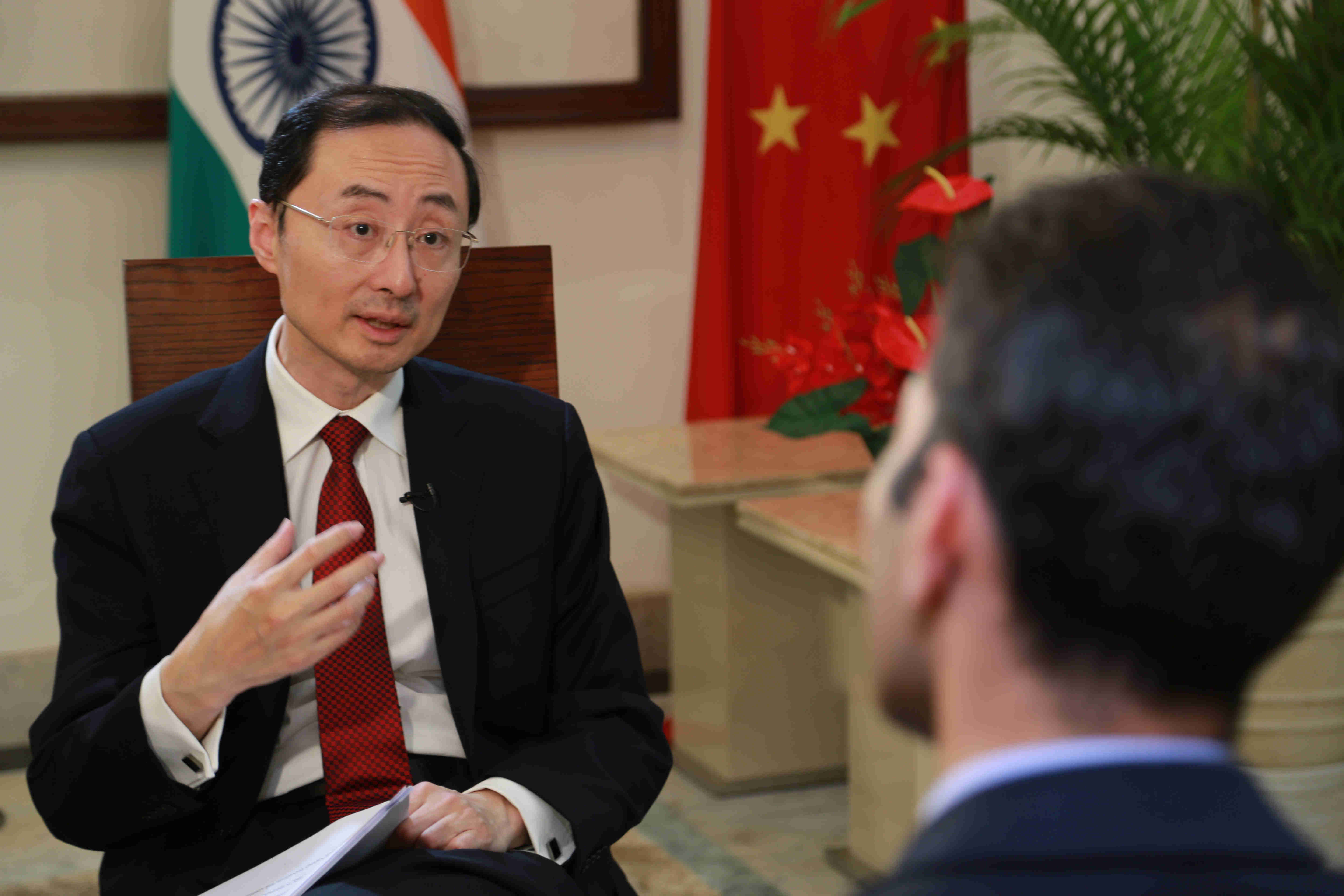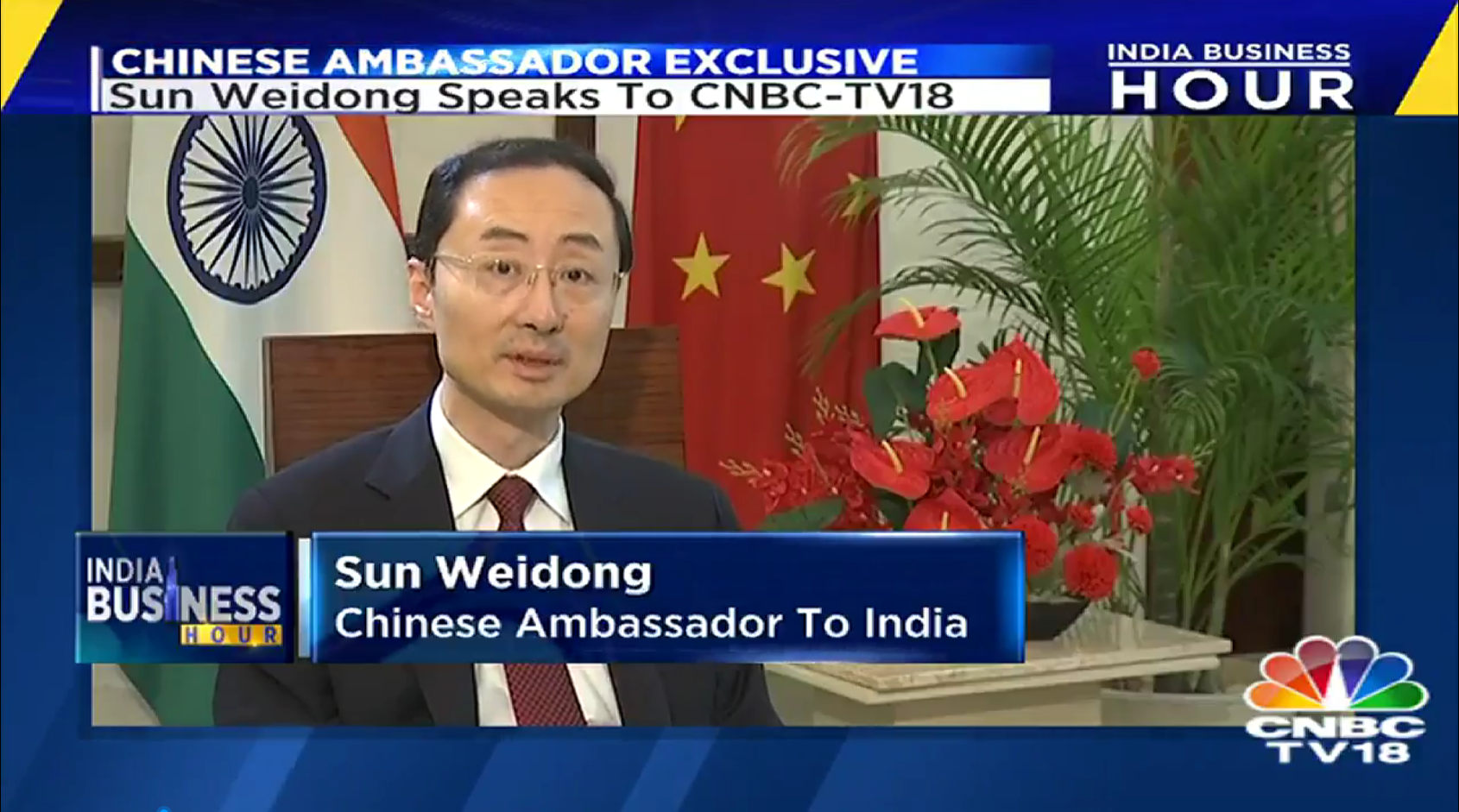|
On March 12th, 2020, Chinese Ambassador to India H.E. Sun Weidong gave interview to CNBC-TV18 on COVID-19. The main content of the interview is as follows:

Q: It is reported that the Chinese government is closing some makeshift hospitals. Do you feel the outbreak is coming under control now?
A: This Tuesday, all 16 makeshift hospitals in Wuhan have been closed. This shows that China’s prevention and control efforts are producing positive results. The number of new confirmed cases drops from several thousand to around 20 a day. The cure rate of patients has been rising, with more than 60,000 patients recovered nationwide, which means 76% of patients discharged from hospitals. We can say now this round of epidemic peak is over.
President Xi Jinping pointed out that this epidemic is a major public health emergency for China. Thanks to extraordinary efforts made by Chinese people, the situation is turning for the better. We have full confidence, capacity and determination to win the battle against the epidemic.
At the same time, our fight against the epidemic is still at a most demanding stage. Our task is arduous. We will continue to strictly implement various prevention and control measures, and consolidate the progress we have made.
Q: What have been the key experiences from the last two months of hardships? Is there a strategy in place for the next few months?
A:The fight against the outbreak is a major test for China. President Xi Jinping has personally taken charge of the nationwide response. Recently he went to Wuhan, the epicenter of the epidemic, to make inspection. This visit has greatly inspired the people of Wuhan and the whole nation. Chinese government has mobilized all sectors of society to step up prevention and control work to protect people’s health and life.
If you ask me the key experiences, I can share with you the following:
First, ensure early detection, early reporting, early quarantine and early treatment to raise cure rates and reduce fatality rates;
Second, pool the best medical resources and professionals to enable effective treatment of patients.
Third, mobilize the whole nation to support Hubei and Wuhan in this battle;
Fourth, set up national joint prevention and control mechanism to curb the spread to other provinces and regions;
Fifth, strengthen the emergency supply of medical materials and daily necessities to ensure logistic support.
Most importantly, we launched the people's war against the epidemic. Chinese people have contributed their best. Many people involved in this battle demonstrated unparalleled courage and professionalism, made extraordinary sacrifice and dedication. More than 40,000 medical workers across the country went to support Hubei and Wuhan. Some doctors and nurses even lost their precious lives. They are all well-deserved heroes.
We will continue to make unremitting efforts to implement all prevention and control measures. The following steps are important: first, allocate medical resources and important materials in a scientific way; second, speed up scientific research and development; third, expand international and regional cooperation. We will not declare victory until the virus is completely defeated.
Q:To what extent have businesses and the manufacturing sector resumed work in China? What are the measures that the Chinese government is taking to support the economy during this period? What impact does the epidemic have on China’s economy?
A: We are doing our work with two hands. On the one hand, we are fighting against the epidemic. On the other hand, we are resuming the production to ensure sustained and sound economic development.
According to the latest data, the work resumption rate of 48,000 state-owned enterprises and big industrial enterprises has exceeded 90%. Among China's top 500 manufacturing enterprises, it has exceeded 97%. More than 300 million people have returned to work since February. Production and life in most parts of China have begun to recover gradually and orderly.
The Chinese government has taken a series of measures in finance, banking and other fields to support economy, such as increasing capital investment, introducing tax reduction and fee reduction, increasing credit support with preferential interest rates. Local governments have also taken effective measures to ensure employment and people's livelihood, strive to minimize the negative impact on economy.
President Xi Jinping stressed that the impact on Chinese economy will be short-lived and generally manageable. The fundamentals of China's economy will remain strong in the long run. We are confident that we can and we will meet this year’s economic and social development goals. We will complete the key tasks of establishing a moderately prosperous society and eliminating absolute poverty in China.
Q: How does the outbreak affect China's position in the global supply chains? Some media said that some multinational companies should seize the opportunity to move out of China. How do you think that some industrial chains may be transferred to other countries?
Since the outbreak of the epidemic, the production of Chinese enterprises has been disrupted. Global supply chains have also been affected to some extent. But as China restarts the work and production, the supply of various products will gradually return to normal.
China will ensure production and supply resumption of leading enterprises and key sectors. We will also support major exporters to resume operation at an early date. All these measures will help maintain stability of global supply chains.
China's important role in global supply chains has been established for a long time. It’s market choice for multinational companies to produce in China. "Made in China" has many advantages such as large-scale production, high refinement, high specialization, high quality and efficiency. It’s difficult to be replaced in a short time.
China’s competitiveness in attracting foreign investment remains unchanged. The confidence and strategies of many multinational companies in China also remain unchanged.
In this era of globalization, industrial and supply chains are deeply integrated. It serves nobody’s interests and not easy to try to "shift" or "decouple" the linkage. We need to be highly vigilant against all forms of unilateralism and protectionism. We should promote globalization, stay united to overcome the epidemic, pursue mutual benefit and win-win results.
The economies of China and India are highly complementary to each other and enjoy broad space for industrial cooperation. The two sides are exploring the establishment of a manufacturing partnership. We will further strengthen cooperation and deepen bilateral economic and trade relations.

Q: How does China view India's support to China's fight against the epidemic? How will China and India enhance cooperation in fighting the epidemic in the future?
China and India have maintained close communication and cooperation on epidemic prevention and control since the outbreak. Indian Prime Minister Modi sent a condolence letter to President Xi, Minister Jaishankar had telephone conversation with Chinese State Councilor Wang Yi. They all expressed support for China. The Chinese side appreciates the medical supplies provided by India. We also helped facilitate the safe return of Indian nationals from China.
Recently, we have received many condolence messages from all sectors of the Indian society. Here are a few of examples, Confederation of Young Leaders and Manav Rachna Educational Institutions co-hosted the signature campaign “Stay Strong China, We are with You”. More than 2,000 Indian students wrote messages of support for China. Indian business leaders organized a roundtable discussion entitled “ We Stand with China”. Indian movie star Mr.Aamir Khan recorded a heart-warming video of blessings. The India-China Friendship Association, the China Institute of Kolkata International University, Indian graduates studied in China and many Indian people expressed the solidarity with China in various ways. I am deeply touched by the understanding and support from all the Indian friends.
I have noticed that the number of confirmed cases in India has been increasing recently. I sincerely wish the patients an early recovery. We are ready to share our experience with Indian side, strengthen public health cooperation, and make joint efforts to overcome the epidemic.
Q: What cooperation has China had with other countries since the outbreak? Does that include co-developing a vaccine?
Since the outbreak of the epidemic, China has acted in an open, transparent and responsible manner. We shared information with the WHO and the global community. We also sought cooperation with the world. Our efforts are highly recognized by the WHO and the global community.
President Xi Jinping pointed out that public health security is a common challenge for humanity and requires a joint response from all countries. As COVID-19 cases have emerged in many countries, there is a need to step up communication with the WHO and enhance research cooperation with the countries concerned, particularly those most seriously affected. We should cooperate on source tracing, drugs, vaccines and testing.
China has donated $20 million to the WHO. We have provided testing reagents to other countries and organizations such as Japan and the African Union. We shared diagnosis and treatment experience and protocols with many countries including India. We have sent volunteer expert teams to Iran, Iraq and next to Italy. The Red Cross Society of China and relevant enterprises have also provided reagents to Iran and African countries.
As of the vaccines, Chinese science and research teams are working hard to develop them. Some have entered animal testing stage and are expected to apply for clinical trials hopefully in late April. At the same time, China will strengthen cooperation with relevant countries, strive to promote the early launch and use of vaccines.
All in a nutshell, in the fight against the epidemic, China will contribute our wisdom and strength together with the world to build a community with a shared future for mankind.
|